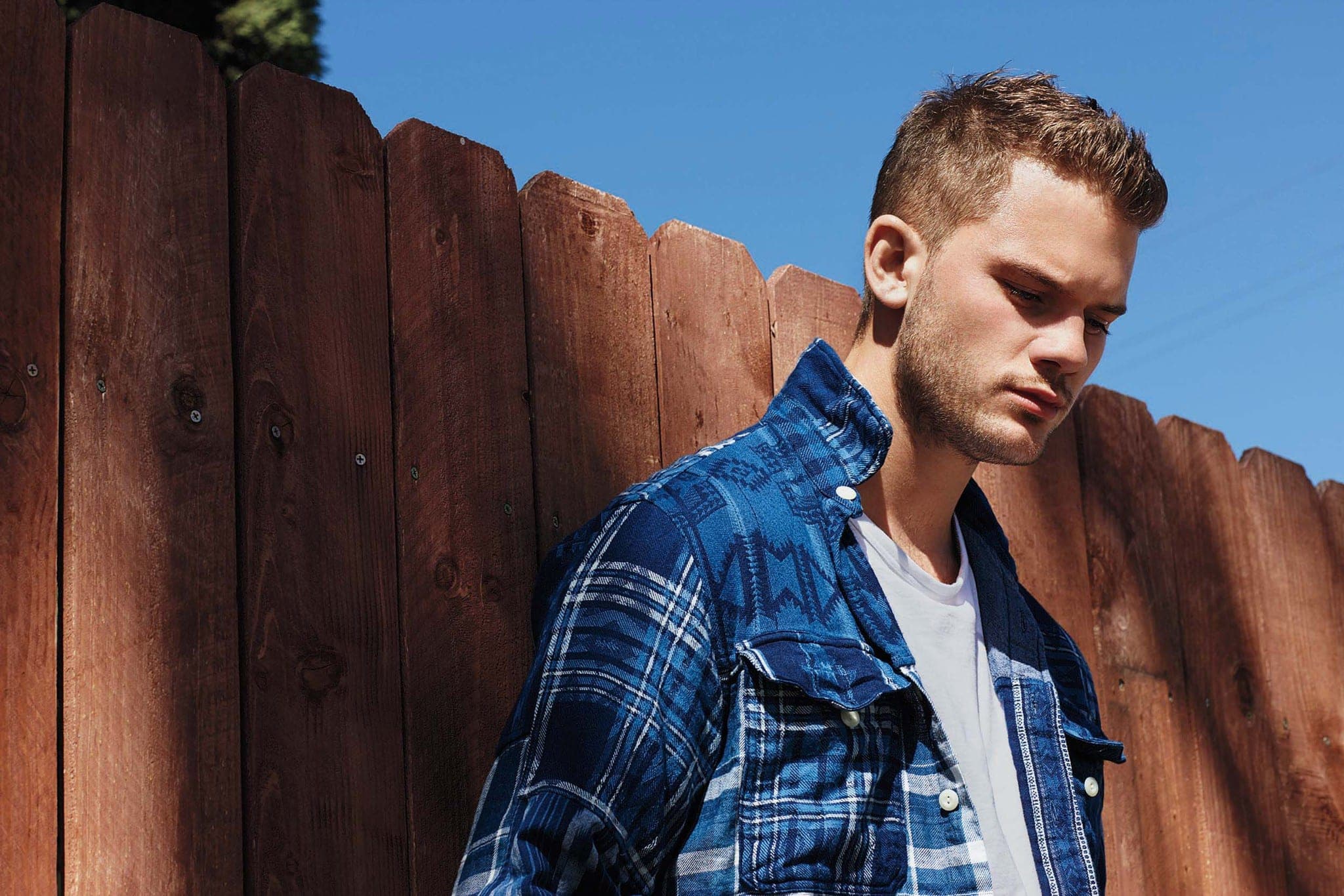JEREMY IRVINE
MAKES
HIS OWN
LUCK
Photography by Randall Mesdon
Written by John Horn — Styled by Bill Mullen

Indigo patchwork cotton shirt POLO RALPH LAUREN Cotton T-shirt RAG & BONE
It’s a cruel paradox for an actor. To get work, you first have to have done work: without credits and a compilation video of your earliest film and television work (even if it’s just playing a dead body on Law & Order) that you can present to agents, producers, and casting directors, you’re just one more random face, another pretty head shot, the next in a long line of impossible dreamers.
Several years back, when he was all of eighteen years old, British actor Jeremy Irvine realized that he, like so many before him, was caught in the industry’s inexorable catch-22. But unlike those countless others helpless to escape it, he conjured up his own performance history. With several friends, he shot scenes of himself in nonexistent films, credited to fictional directors. “I did my best to make them look like real movies,” Irvine says of his scheme. Stitching together those imaginary roles into one reel of his simulated greatest hits, Irvine then sent the assembly to London talent scouts.

Denim jacket and cotton T-shirt RAG & BONE
“I don’t know if anyone really believed me, but one agent took pity on me. He signed me on a Friday,” Irvine says. The following Tuesday, the agent rang Irvine up: Might he be inclined, for his very first real film role, to star as the lead soldier Albert Narracott in Steven Spielberg’s epic battlefield drama War Horse? The answer, and the rapid acceleration of Irvine’s career, was clear. Soon thereafter, Irvine would appear opposite Michael Douglas, Colin Firth, Nicole Kidman, Ralph Fiennes, Helena Bonham Carter, Robert Duvall, and Dakota Fanning. He no longer needed a reel of fake clips. (Even as his stardom has risen, Irvine remains represented by the same London agency that first signed him.)
You might on occasion be able to make your own luck in life, just as Irvine did, but talent and determination and an unshakable confidence in yourself are invariably as critical as providence. At one point in his youth, Irvine saw a future that was as limited and bleak as the local grocery store shelves he used to stock. His father was steering him toward a career as a welder, and he even applied for the army, only to be rejected because he has diabetes. Thankfully, a teacher named Jason Riddington recommended acting—almost as the equivalent of boot camp—and that sparked a passion inside the teenage Irvine that could not be extinguished.
“I was always a little bit of an outsider. I wasn’t excited by academia. It wasn’t really my thing.” So rather than prepare to study for a trade or profession (his father is an engineer, his mother a local politician), he performed as Romeo in a school production, joined the National Youth Theatre, and followed that with a stint at the London Academy of Music and Dramatic Art. “It was the rebellious thing to do, to say ‘fuck you’ to all my academic studies.”
irvine conjured up his own performance history. with several friends, he shot scenes of himself in nonexistent films, credited to fictional directors
Yet rebellion doesn’t always (and usually doesn’t) yield tangible results, and Irvine for the longest time couldn’t get anyone to pay attention to him or his work. “You have no idea what it’s really like. You’re dealing with rejection on a pretty much daily basis. You’re going on as many as four or five auditions a week. And I didn’t get a call back for a year and a half,” Irvine says. About the best he could get was a part as a nonspeaking tree in a Royal Shakespeare Company show. “You need to have some real resilience. And I just said to myself, ‘I’m gonna show these fuckers.’”
That’s when he cooked up the idea for the bogus clip reel. Even if the movies weren’t legit, Irvine labored to make sure his acting in them was. “I really did my absolute best,” he says.
To launch a movie career with a Spielberg film can be both a blessing and a curse. The benefit was the notice: War Horse might not have attracted the greatest reviews, but critics noticed its neophyte star. “Irvine is the very picture of a sturdy, well-intentioned, ruddy-faced English country lad of a hundred years ago,” the Hollywood Reporter said in its write-up. And even if Irvine admits he was “terrified” on the film’s set when filming started, costar Tom Hiddleston reminded Irvine that acting was just another job, and that if he needed to have a meltdown, he could do it when he went home at the end of the day.

Denim jacket and cotton T-shirt RAG & BONE Denim jeans J.CREW Vintage leather belt WHAT GOES AROUND COMES AROUND
“There are always going to be movies you say yes to that end up not working. And then there are movies that you say no to that turn out really well,” Irvine says. But he knows well enough that the movie industry’s business model favors commerce over creativity, which is why you aren’t likely to find any superhero movies on his résumé. “We all complain about Hollywood regurgitating the same formulas, the same stories.
you’re dealing with rejection
on a pretty much daily basis.
i just said to myself, ‘i’m gonna show these fuckers’
But if you’re going to spend $200 million and more on a movie, you’re not going to try to tell a risky story.”
It’s not just lip service. Irvine recently starred in director Roland Emmerich’s low-budget and controversial Stonewall, an account of the gay-rights protests in late 1960s New York, in which he plays a gay man. Even if the movie was criticized for its dramatic liberties, Irvine says the role—and the experience of making Stonewall—was transformational. “Stonewall, for an actor, is kind of the dream role; I’m very proud of it. And I’m sadly amazed how relevant its story still is today.”

Linen herringbone blazer MICHAEL BASTIAN Plaid flannel shirt POLO RALPH LAUREN
As he continues to make movies—in 2016, he will star in The Beautiful Fantastic—Irvine is essentially enrolled in a kind of on-the-job film school. With some theatrical training but no formal instruction in movie acting, Irvine was and continues to be an eager student with some formidable teachers. “I see the amazing amount of work that goes into a great performance. These people—Michael Douglas, Helena Bonham Carter— didn’t become famous overnight. They became famous by working incredibly hard. Michael Douglas [whom Irvine acted opposite in Beyond the Reach] is seventy-one years old, and he doesn’t stop in terms of his preparation. Helena Bonham Carter [his opposite in Great Expectations] with stacks of notebooks full of ideas. It’s a very steep learning curve.”
Now, of course, Irvine can assemble an impressive clip reel without scenes from fake movies. “For any actor to complain about being too busy—you just can’t,” Irvine says. “I never thought acting would be more than a hobby. And here I am.”